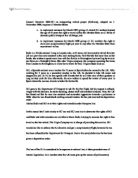Analysis of Legal Arguments:
Let us begin with jurisdiction first, under the ambit of Article 177, the EU court has jurisdiction over the member-state court where it involves interpretation of the phrases and words of the Treaty, and this issue was not objected to. However, the Benelux countries concurred that they infringed Article 12 of the Treaty under the Brussels Protocol and have increased the duty, but they disputed that such an infringement by a member state could be referred to ECJ on a commission’s initiative contravening Article 169 or 170. The Dutch believed that there is a conflict between Article 12 and the Brussels Protocol. Therefore, the case is within the jurisdiction (which embodied the two international treaties) of Netherlands courts and must be decided under national law. Here, sovereignty is at play and a subtle challenge to ECJ or EU in general. VGL affirmed that Article 12 has internal effect and has direct cause, as tariff applied by Member States for trade activities with each other were constrained under Article 14 of the Treaty of 1957.
On the other hand, the Court determined that problem is related to interpretation of the Treaty and has jurisdiction. The Court emphasized that the structure of the Treaty obliges all member states to establish community law through various institutions, affect this legal system through national courts and uniformly apply for the entire Community. Further, Article 12 allowed the members states to seen as subjects of the negative obligations and the argument of Benelux countries over Article 169 and 170 were termed as ‘misconceived’. Thus, Community law would triumph over any contradictory state laws even if amended at a later date. Through this, authority or proclamation of EU law is sought by limiting national sovereignty and would allow states or individuals to invoke their rights through EU courts and tribunals.
However, the Court did not give its judgment on the customs duty levied for VGL on the import of the product and asked the national courts to determine them in line with the interpretation of Article 12 (where ‘individual rights must be protected by national courts’) given by the Court is higher than that of the duty levied whilst enforcing the treaty on 1 January 1958.
Conclusion:
The judgment was revolutionary as it took radical measures in addressing two major issues; (1) there was no uniformity for the application of EU law by the national courts despite being a member state (at that time there were only 6 member states); and (2) lack of dominance granted to legal system of international law. The judgment by ECJ indicated that there is alternative forum for individuals and member states to invoke their rights and enforce them; this was followed and emboldened by another decision in Costa v ENEL.
[1963] CMLR 105, [1963] ECR 1
The classification of 39.01-a-1 is listed in ‘Tariefbesluit’ (Brussels protocol) enforced from 1 March 1960, this taxonomy was a part of Brussels Protocol executed between Belgium, Luxembourg and Netherlands on 25 July 1958 and made into a law by Netherlands on 16 December 1959. The products within the ‘Tariefbesluit’ is listed in para 3 of the judgment at [4].
The objection was lodged with the Inspector of Customs and Excise at the Zaandam against the application of tax under 39.01-a.
The European Economic Community (‘EEC’) treaty (Treaty of Rome) was established on 25 March 1957 but enforced on 1 January 1958. The critical element of this treaty was cooperation between member states, establishing of a common market between its members, achieving a customs union to abolish inherent trade barriers such as custom duties, import limitations and other relevant issues. Today, it is termed as ‘Maastricht Treaty of 1992’ which amalgamates three communities, such as, Euratom, EEC and ECSC.
The product imported by VGL were classified under 279-a-2 of the import tariff classification of 1947 and were only charged 3% import tax as duty. However, this classification of 279-a-2 was changed on 1 March 1960 in the tariff charter under the revised heading of 39.01-a, were import duty was fixed at 8% for certain products, such as, aminoplasts and aqueous emulsions or solutions or dispersions; whilst all other goods still remained under article 279-a-2 where the import duty was still applied at the rate of 3%.
See [1963] C.M.L.R 105 – ‘Article 12 of EEC Treaty…directly applies to a member state for the benefits of its citizens and individual rights must be protected by the courts of the member states’. Also see ‘EEC Treaty 1958’ - ‘Section 1 of The elimination of customs duties as between Member States’ Article 12 states: ‘Member states shall refrain from introducing, as between themselves, any new customs duties on importation or exportation or charges with equivalent effect and from increasing such duties or charges as they apply in their commercial relations with each other.’ <> accessed: 6 December 2014.
Inadmissibility occurred as the protest lodged was against the rate and not against the actual tariff levied on the import of the goods.
See [1963] C.M.L.R 105, at para 108.
Sharon Hanson Legal Method, Skills and Reasoning, (3rd Ed., Routledge-Cavendish 2010), id at [136-137] or [143] related to Article 234 (at present and formerly as Article 177 of the Treaty of Rome).
see ‘EEC Treaty 1958’, Article 14 (1) of the treaty, where it states: ‘In respect of each product, the basic duty which shall be subject to the successive reductions shall be the duty applied on 1 January 1957.’
See [1963] C.M.L.R 105, id at [11].
ibid, at [14] - The arguments indicate that the Community law is of better quality than the national laws and also demonstrates that the regulatory quality is superior.
[1964] E.C.R. 585, [1964] C.M.L.R. 425 – The importance of this judgment is that unilateral laws or national laws which are not compatible with Community law will not prevail in the EU.









